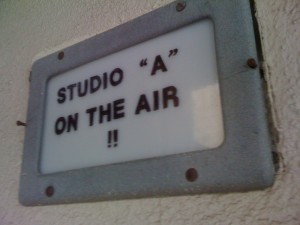On April 27, a massive tornado hit Tuscaloosa, Alabama, devastating entire neighborhoods. Parts of the city’s basic infrastructure were damaged and power outages were rampant. As was the case following natural disasters in other parts of the world (such as the earthquake in Haiti), radio has been a lifeline for residents of Tuscaloosa.
WVUA-FM at University of Alabama was knocked off the air for nearly two days, but when they resumed broadcasts, they worked to provide information for residents. WVUA has an entire section of their website devoted to news about Tornado 2011, with information on both how to help and details about receiving aid. An article in the Crimson White stated that,
“The station went back on-air Friday [April 30] at 12:30 p.m. with the goal of using their medium to inform the community of volunteer efforts, donation locations and any other information related to the tornado relief effort.
‘We feel that the radio is a powerful tool in times like these to get information out quickly and effectively,’ WVUA-FM station manager Chris Dodson said. ‘The unique aspect of our situation is that we are airing both on the Internet and the radio so that our message is able to reach those who may not have the sources to listen on the Internet.’
Dodson said that WVUA-FM is using social media, including both Facebook and Twitter to pass along information as well.”
Beyond the role of college radio in the aftermath of the tornado, commercial stations have also pitched in. An opinion piece in the Wall Street Journal by University of Alabama professor David Beito explains the major role that the four local Clear Channel stations (WACT-AM, WRTR-FM, WTXT-FM and WZBQ-FM) have played in helping connect residents with assistance:
“Other than churches, much of the strength of Tuscaloosa’s extensive mutual aid comes from an unlikely source: right wing talk radio. The four Tuscaloosa Clear Channel stations have pre-empted their normal fare of Rush, Hannity and top 40 songs to serve as a relief clearinghouse through simulcasts. Gigi South, the local market manager for Tuscaloosa Clear Channel, says that it was her decision to begin the simulcasts.
It was hard to do otherwise. Employees saw demolished neighborhoods outside their windows and the desperate calls for help came in almost immediately. Because many residents lost power and were unable charge cell phones, battery-operated and car radios often became their only form of communication.
These stations have only 12 full-time employees among them, but they’ve have had a vast impact. The on-air jocks have taken on grueling shifts, sometimes working 10 hours straight.
The goal of the simulcasts is simple: Connect givers and victims and allow them to exchange information. According to Ms. South, ‘this whole thing has been about connecting listener to listener. They are the ones doing this. We’re just the conduit.'”
The article explains that listeners have dropped off items at radio stations in order to help people who are in need. Listeners call in to explain what type of help or item is needed and then others in the area have risen to the challenge and will show up where the help had been requested. According to the piece,
“In one particularly moving case, a worn-out relief coordinator for an outlying trailer park broadcast a desperate appeal. She had been cooking meals for several undocumented Hispanics living in tents who were afraid to go to the authorities. She was heartbroken because she wanted to visit her mother in Mississippi who had suffered a stroke, but she feared leaving her neighbors unaided.
Within minutes, two nurses, translators, and other volunteers were on the scene. The simulcast now includes brief Spanish language announcements. And listeners, even if they are normally angered about illegal immigration, show no hesitation in lending a hand in such cases.”
In addition to on-air appeals for help, the stations have been using their websites and social media tools like Twitter and Facebook to send out calls for assistance. As recently as today, Talk Radio 105.9 posted a number of ways to help on their Facebook page, including news about a blood drive as well as requests for Diesel fuel, non-perishable food items, and volunteers. Listeners can also post requests to the station’s Facebook wall.
What’s happening over Tuscaloosa airwaves is an amazing representation of how both old and new media can be activated in times of crisis and it’s also a crucial reminder of local, terrestrial radio’s continuing importance, especially when an emergency strikes.



